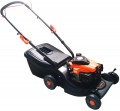Min. cutting height
The minimum cutting height provided by the lawnmower — that is, the smallest height of grass that can remain after the passage of the machine. It makes sense to pay attention to this indicator mainly in cases where the lawn is planned to be cut as short as possible. In addition, the lower the minimum height (with the same maximum), the wider the height adjustment range of this model.
Max. cutting height
The maximum cutting height that the lawn mower can achieve is the maximum height of grass that can be left after the machine has passed.
This parameter is relevant mainly for those cases when you want to leave the grass on the lawn relatively long. In addition,
lawn mowers with high cutting heights have a wide range of mowing adjustments.
Number of height settings
The number of cutting height settings provided by the lawn mower. The more such settings (with the same adjustment range) — the more accurately you can choose the mowing height. Note that in some robots (see "Type") this number reaches 30 or more with a range of 30 to 60 mm; in other words, you can select the height to the nearest millimetre.
Bag type
A type of bag used in a lawn mower to collect grass clippings.
—
Hard. Bags (containers) made of a hard material, usually plastic. Such a container is more convenient to unload than a soft one, it is more durable and reliable, but it weighs a little more.
—
Soft. The advantages of soft fabric bags are primarily low weight and the ability to fold after hours, which can facilitate storage. In addition, the degree of fullness of such a bag can be controlled by eye without any special indicators. On the other hand, soft bags are very inconvenient to unload.
—
Combined. Bags that combine soft and hard materials in construction; the upper part is usually made solid. This combination makes it easier to unload the bag and at the same time allows it to be rolled up quite compactly for storage.
— Is absent. The absence of a bag is characteristic of some varieties of mowing units — in particular, mowers and trimmers (see "Type"). In classic lawn mowers, it usually means that this model does not involve collecting grass — all cut vegetation remains on the ground. At the same time, most of these models have the function of mulching (see above), however, there are exceptions.
Bag volume
The volume of the grass clipping bag supplied with the lawn mower. Manufacturers select this volume depending on the power, performance and overall level of the unit, however, similar models may differ in this indicator. In such cases, it is worth considering that a larger bag takes longer to fill and needs to be unloaded less often, but it weighs more and takes up more space (even when empty). Mostly the difference in the volume of the bag is 5 liters and there are
lawn mowers for 35,
40,
45,
50, 55,
60,
65,
70 and more liters.
Motor model
Model of the engine installed in the lawn mower. The main performance data of the engine is usually indicated in the general data for the unit. However, knowing the exact name of the motor, you can find more detailed information on it — from specific data to reviews and reviews. Also, data on the engine model can be useful when searching for spare parts or consumables.
Motor power
Lawnmower engine power expressed in horsepower. The common unit of power these days is the watt, but gasoline and diesel engines (see "Engine Type") are traditionally referred to as hp. Some units are easy to convert to others: 1 hp. approximately equal to 735 watts.
In general, the more powerful the engine, the more performant the mower is and the better it handles with heavy work such as cutting thick grass, bushes, etc. On the other hand, high power has a corresponding effect on fuel consumption, as well as the weight and price of the engine. In addition, it should be taken into account that different types of mowers (see "Type") differ in terms of power requirements. For example, among trimmers there are many models with a capacity of
0.7 – 1.3 hp., for gasoline lawn mowers, the minimum power is already in the range of
1.3 – 2 hp., and for
mowers,
at least 2.5 hp is required. . So you can only compare units of the same type in terms of power. Detailed recommendations for choosing a mower depending on its type and features of the planned work can be found in special sources.
Fuel tank volume
The volume of the fuel tank in a gasoline or diesel mower (see "Engine type").
A large tank allows you to work longer without refueling, but an excessive increase in capacity affects the dimensions and weight of the entire unit. So manufacturers usually select this indicator taking into account the power and fuel consumption of a particular engine, and in general, the volume of the tank is not critical when choosing. However, knowing the tank capacity and fuel consumption (see above), you can estimate how much one refueling will approximately last.
Deck material
The material from which the deck is made is a protective casing that covers the cutting tool of a lawn mower or trimmer. In modern mowers there are such options:
— Plastic. The cheapest and at the same time the least durable material.
— Aluminium alloy. The most advanced option: these decks are durable, lightweight and less prone to corrosion, but quite expensive.
— Steel. It has greater strength than aluminium alloy and costs less, but is heavier and more prone to corrosion.

